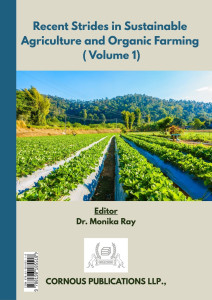

The scope of the book "Recent Strides in Sustainable Agriculture and Organic Farming" are as below
1. Sustainable Agricultural Practices
Technological Innovation: Incorporation of novel technologies, such as precision agriculture, artificial intelligence, and data analytics, for more efficient and sustainable agricultural activity.
Soil Health Management: Practices to ensure sustainability of soil fertility, which include crop rotation, agroforestry, composting, and organic inputs in order to ensure long-term soil vitality without reliance on synthetic fertilizers.
Water Conservation and Management: Innovative ways of efficient use of water, such as drip irrigation systems, rainwater harvesting, and drought-resistant cropping system development.
Energy Efficiency: Introduction of renewable energy alternatives in farm use, including photovoltaic irrigation and sustainable sources that reduce carbon footprints around farming.
2. Organic Farming Practices
Integrated Pest and Disease Management: Balanced biological methods for controlling pest damage, organic pesticides, and natural predators for managing ecosystems in the farm system.
Certification and Standards of Regulation: This deals with the organic certification process, global standards, and regulation frameworks that ensure conformity with the principles of organic farming.
Nutrient Management: Practices to optimize crop nutrition with the use of organic fertilizers, green manures, and compost to achieve a minimum environmental impact.
Conservation of Biodiversity: Organic farming has become an important tool in supporting biodiversity, enhancing ecosystem services, and promoting agroecological systems that have favorable support for a high species diversity.
3. Environmental Sustainability and Climate Resilience
Carbon Sequestration: Evaluation of the potential of practices in sustainable agriculture to become part of climate change abatement through soil carbon sequestration and agroecologic approaches.
Climate-Resilient Agricultural Practices: Developing strategies for crop types and farming systems that can stay resilient in extreme weather scenarios and climate change conditions.
Environmental Footprints Reduction: Transition from conventional, chemical-intensive farming to systems that reduce the environmental footprint, such as lower greenhouse gas emissions, reduced chemical use, and improved land conservation.
4. Social and Economic Aspects
Farmer Empowerment and Education: Initiatives that support the training and empowerment of farmers, especially smallholders, in adopting sustainable and organic farming practices through education and capacity-building programs.
Market Dynamics: The growing global demand for organic produce and eco-friendly agricultural products, exploring consumer behavior, market trends, and the economic viability of sustainable farming models.
Policy and Advocacy: The role of government policies, international agreements, and grassroots movements in shaping the future of sustainable agriculture and organic farming.
5. Case Studies and Global Perspectives
Global Success Stories: In-depth case studies of regions or farms that have been successful in implementing sustainable or organic farming practices, with clear results and scalability.
Challenges and Solutions: Identify the major barriers to the large-scale adoption of sustainable practices and the strategies used to overcome these barriers.
Comparative Study: Cross-regional review of how various countries and cultures are embracing sustainable agriculture methods and how these practices influence the local economies and the environment.
6. Future Studies and Directions
Emerging Trends and Innovations: Latest research in sustainable agriculture and organic farming, which involves progress in biotechnology, agroecology, and regenerative farming techniques.
Policy Recommendations: Insights into the policy frameworks needed to scale up sustainable farming methods to meet international food security and sustainability objectives.
This book provides thorough and up-to-date analysis of how sustainability, agriculture, and organic farming intersect, proving to be a vital source for researchers, policymakers, practitioners, and students focused on sustainable food systems and stewardship of the environment.
PAID ACCESS | Published on : 22-Jan-2025 | Doi :10.37446/volbook112025/1-8 | Pages : 1-8
PAID ACCESS | Published on : 07-Feb-2025 | Doi :10.37446/volbook112025/9-20 | Pages : 9-20
PAID ACCESS | Published on : 07-Feb-2025 | Doi :10.37446/volbook112025/21-31 | Pages : 21-31
PAID ACCESS | Published on : 04-Mar-2025 | Doi :10.37446/volbook112024/32-42 | Pages : 32-42
PAID ACCESS | Published on : 06-Mar-2025 | Pages : 43-53
PAID ACCESS | Published on : 26-Apr-2025 | Doi :10.37446/volbook112024/54-58 | Pages : 54-58
OPEN ACCESS | Published on : 26-Apr-2025 | Doi :10.37446/volbook112024/59-70 | Pages : 59-70
PAID ACCESS | Published on : 04-May-2025 | Doi :10.37446/volbook112024/71-78 | Pages : 71-78
PAID ACCESS | Published on : 03-Jun-2025 | Doi :10.37446/volbook112024/79-86 | Pages : 79-86
OPEN ACCESS | Published on : 14-Jun-2025 | Doi :10.37446/volbook112024/87-100 | Pages : 87-100
PAID ACCESS | Published on : 15-Jul-2025 | Doi :10.37446/volbook112024/101-114 | Pages : 101-114
PAID ACCESS | Published on : 08-Aug-2025 | Doi :10.37446/volbook112024/115-129 | Pages : 115-129
PAID ACCESS | Published on : 08-Aug-2025 | Doi :10.37446//volbook112024/130-138 | Pages : 130-138
OPEN ACCESS | Published on : 14-Jan-2026 | Doi :10.37446/volbook112024/139-147 | Pages : 139-147

ISBN : 978-81-981855-1-8 Doi: 10.37446/volbook112025